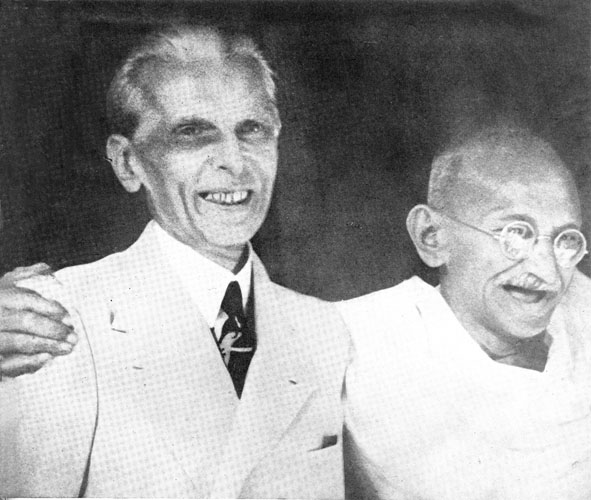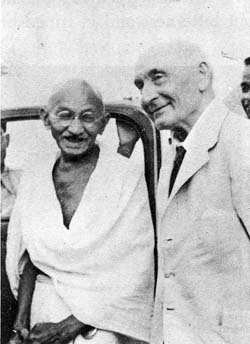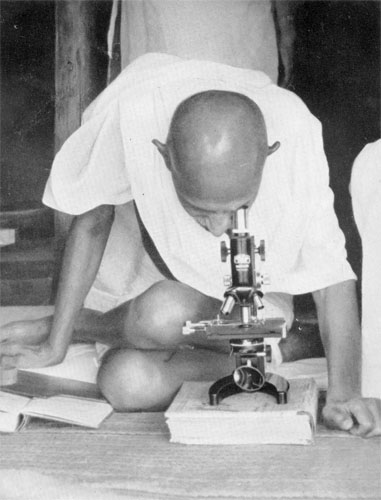
Some men changed their times...
One man changed the World for all times!
Comprehensive Website on the life and works of
Mahatma Gandhi
+91-23872061
+91-9022483828
info@mkgandhi.org

+91-23872061
+91-9022483828
info@mkgandhi.org
23. Quit India |
 With M. A. Jinnah, 1944 In August 1942 the All India Congress met in Bombay, and was presided over by Maulana Abul Kalam Azad. Again the demand to set up a provisional Government was made. 'We can no longer hold back our people from exercising their will,' Gandhi said. 'Nor can we go on eternally submitting to the imperialist policy. The time has come for the English to go. Civil servants, army, officers, Government officers all of them should quite India.' The 'Quit India' resolution was drawn up and passed the meeting for presentation to the Government. Jawaharlal moved the resolution and Sardar Patel seconded it. The resolution also announced the starting of a mass struggle on the widest possible scale. Winding up the meeting, Gandhi said, 'I have pledged the Congress, and the Congress has pledged herself that she will do or die.' The Government did not wait for the mass movement to begin. Overnight Gandhi was arrested, and also many other leaders in various parts in India. Gandhi was interned in the Aga Khan's palace in Poona. Mahadev Desai, Kastubai, Mrs. Naidu, and Mirabehn were also taken there. But with the leaders in jail, India did not remain idle, movements every where. And there was great outburst of violence throughout the country. People started destroying government buildings and whatever else they considered to be symbols of British imperialism. Shortly after his detention in the Aga Khan's palace Ganhid suffered a grievous bereavement, Mahadev Desai, his faithful and able secretary, died of a heart attack. 'Mahadev has lived up to the "do or die" mantra,' Gandhi said. 'This sacrifice cannot but hasten the day of India's deliverance.'  With Lord Pethick-Lawrence, 1946 All over India there were strikes and disorder. Lord Linlithgrow, the Viceroy, attributed all this to Gandhi. Gandhi had invited violence, he claimed. In a long series of letters to Lord Linlithgow Gandhi tried to persuade him to retract this charge against him. Failing in this, Gandhi decided to undertake a fast as 'an appeal to the Highest Tribunal' against the unjust charges. Gandhi fasted for twenty-one days in February 1943. It was a great ordeal, but he survived the fast. Kasturbai nursed him back to health, but her own health was failing. She suffered two heart attacks. Gandhi tried his best to save her, but Kasturbai grew worse. One day she died quietly in Gandhi's arms. A few weeks later Gandhi was taken seriously ill with malaria. The Indian people demanded his immediate release and the authorities, believing that he was nearing death, released him. Gandhi was slowly resorted to health. The demand for Indian independence had now grown in to a world-wide question. Apart from India's own attitude, America and other countries pressed Britain to grant freedom to India. Churchill did not yield to any of these approaches. India had always been of help to British property and Churchill was the last man to think of giving up India and thus make Britain the poorer. Two months after Germany's surrender in May 1945, the Labour Party came into power in Britain and Attlee became the Prime Minister. After the defeat of Japan a few months later, the British Government announced that they expected to, grant self-government to India as soon as her internal problems could be solved.  The Scientist This was a victory for India. It was for non-violence. Britain, defeated by the peaceful revolution, would not hold on to India any longer. Britain agreed to a planned withdrawal from India, without bitterness and in friendship. All through his life Gandhi had worked for unity between the Hindus and the Muslims. But he had not had much success. There was a large section of nationalist Muslims in the Congress, but the heads of the Muslim League were drifting further and further away. Gandhi was not man to give up hope, however, and he pursued his efforts to bring about a settlement. On the other hand, Jinnah, the leader of the Muslim League, was hostile to the idea of unity. He demanded a separate Muslim State before freedom was given to India. The Viceroy invited all the leaders to Simla and tried to find a solution and bring about Hindu-Muslim unity, Jinnah would not agree to anything, however. He insisted on having a separate State to be called Pakistan. Britain announced an election in India and the election was held. The Congress won most of the Muslim seats. The deadlock continued. 'We can settle the Indian problem in ten minutes if Mr. Gandhi agrees to the creation of Pakistan,' said Jinnah. 'Cut me in two,' cried Gandhi, 'but do not cut India in two.' He spoke to deaf ears. British Government sent a Cabinet Mission India. It consisted of Lord Pethick Lawrence, Sir Stafford Cripps, and Mr. A.V.Alexander. The task of the Cabinet Mission was to study the situation and suggest what should be done. After careful consideration the Cabinet Mission issued a statement proposing the withdrawal of British authority from India. They had the idea of a united India. |